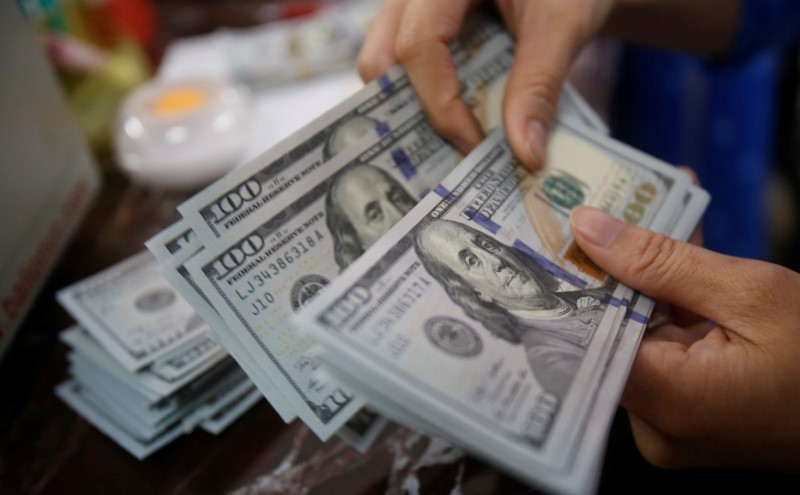* Currency markets wait cautiously for the G20 meet
* Dollar likely to weaken on easing U.S-Sino trade tensions
* Euro hovers near 1.14 mark
* Graphic: World FX rates in 2018 http://tmsnrt.rs/2egbfVh
By Vatsal Srivastava
SINGAPORE, Nov 30 (Reuters) - The dollar trod water in nervous trade on Friday ahead of a meeting of U.S. and Chinese leaders that might, or might not, lead to a truce in the Sino-U.S. trade war, which would boost emerging market currencies at the expense of safe havens.
The greenback has been under pressure this week on growing expectations that the Federal Reserve would slow down its pace of monetary tightening, a view reinforced by comments on Wednesday from Chairman Jerome Powell.
Despite the dovish comments from Fed officials, there was no large scale dollar sell-off, partly due to the strength of the U.S. economy, weakening growth elsewhere, and dollar's own status as a safe haven amid the Sino-U.S. trade war.
It held steady Asian trade, with an index .DXY measuring its value versus six peers up marginally at 96.72.
The focus is now on a planned meeting between U.S. President Donald Trump and his Chinese counterpart Xi Jinping at the G20 summit in Buenos Aires between Nov. 30-Dec. 1.
Trump kept markets nevours by sending mixed signals on Thursday about the prospects for a trade deal with Xi. we see a truce, the Aussie and kiwi dollar will perform exceptionally well. We see a lot of upside in crosses such as Aussie/yen which would benefit from a risk on move," said Nick Twidale, chief operation officer, Rakuten Securities.
"If tariffs on Chinese imports stay at 10 percent, the dollar is likely to weaken in a risk-on move," he said.
Trump has said he plans to significantly hike the existing 10 percent tariffs on Chinese imports by January next year, which would sharply escalate the trade war between the economic heavyweights.
China's economy is already under pressure, with a survey earlier on Friday showing its vast manufacturing sector growth stalled for the first time in over two years in November as new orders shrank. from U.S.-Sino trade talks, the markets would also be focussing on whether OPEC and Russia agree on oil production cuts next week. meaningful rebound in crude prices can be beneficial for commodity currencies such as the Canadian dollar CAD= and Norwegian krone NOK= according to Michael McCarthy, chief markets strategist at CMC Markets.
Dollar investors were also carefully watching for any changes in U.S. monetary policy.
Overnight, minutes from the Fed's Nov. 7-8 meeting indicated that another interest rate hike is warranted. But Fed officials also kept the debate open on when the U.S. central bank might pause its monetary tightening and how it would relay those plans to the public. Fed is widely expected to raise interest rates by 25 basis points in December, which would be the fourth hike for the year.
For 2019, the market is now pricing only one rate hike, according to the CME Group's (NASDAQ:CME) FedWatch Tool, below Fed's projection of three increases during the year.
On Wednesday, Powell said the Fed's policy rate is now "just below" estimates of a neutral rate, which investors interpreted as a signal the Fed's three-year tightening cycle is drawing to a close.
However, some analysts think that the market may be underestimating the number of times the Fed can hike rates next year.
"We believe that Powell has not turned dovish but simply toning down his hawkish tilt. We expect a Fed hike in December and the US economy to keep performing and support another four hikes in 2019," said Philip Wee, currency strategist at DBS in a note.
The dollar weakened 0.07 percent versus the yen JPY= , which changed hands at 113.41 at 0350 GMT. Analysts expect the dollar/yen to remain in an uptrend due to the diverging monetary policies of the Fed and the Bank of Japan.
The euro EUR= was steady at $1.1390, having risen in the last two sessions as the dollar wobbled on Powell's comments.
Elsewhere, sterling GBP= traded at $1.2779, losing 0.1 percent versus the greenback. Traders remain bearish on the pound betting that British Prime Minister Theresa May will fail to win approval for her Brexit deal in a fractious parliament.
"No news is bad news for sterling. There's been no meaningful progress in Brexit negotiations and investors are growing impatient," said Kathy Lien, managing director of currency strategy at BK Asset Management in a note.
The Australian dollar AUD= lost 0.08 percent to $0.7315 on the weak Chinese PMI data.
